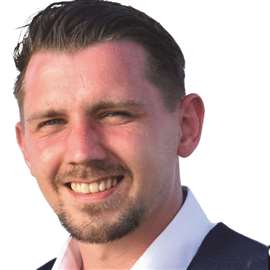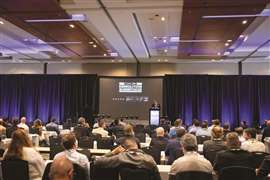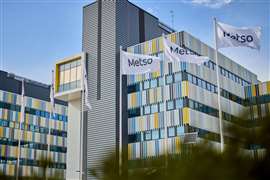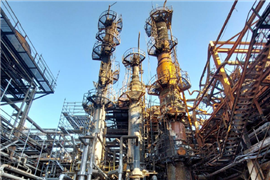JCB - 65 years and beyond
22 July 2011

At number 15 in iC's 2011 Yellow Table of construction equipment, with a turnover last year of UK£ 2 billion (US$ 3.2 billion), up from UK£ 1.35 billion (US$ 2 billion) in 2009, JCB has grown from a regional agricultural trailer manufacturer in Staffordshire, UK, when first established into an international player with a truly global footprint.
The company has manufacturing facilities in the UK, India, the US, Germany, China and now Brazil, where € 70 million (US$ 100 million) is being spent on a new factory for backhoe loaders and excavators. In 2010, it sold 51600 machines, up from 36000 in 2009 at the low point of the recent recession.
Have its 65 years thrown up and particular milestones that stick in Sir Anthony Bamford's mind?
"To me, there are no specific highlights. It has been simply a case of continuing to try to succeed around the world. Each year, we strive to do better. There are lots of milestones along the way, or course, such as the first JCB 3C [backhoe loader] and other product introductions, and then business happenings, such as the opening of our first overseas subsidiary in France and then opening our business in the USA, JCB Inc. Our subsidiary in India has now been operating for 30 years. In its first year we sold 30 machines and this year we will more than 22000," he said.
Sir Anthony is proud to be British and proud of the fact that JCB has grown into a multinational player. "There are not many British family owned companies in engineering that can say that," he said.
With a growing international footprint, might JCB ever look to move the larger proportion of its production outside of the UK? Sir Anthony responded, "Shifting production to, for example, the Far East makes sense when labour costs make up the majority of the cost of production.
"In our case, labour is a smaller component of overall costs - materials make up the largest. We obviously do manufacture in India and China, and the labour costs are different to that in the UK and US, but there is not a major benefit. I like manufacturing in Britain - I am English, after all."
Much is made in the UK concerning a shortage of skilled workforce to support manufacturing. Of this, Sir Anthony said, "Recruiting people with appropriate skills does depend on the skills needed, but normally we can find the right people. Perhaps this is because we stand out as an engineering business in Britain, but there is genuinely a shortage of skilled engineers in the UK, hence the Academy we are involved with.
"We have an arms-length relationship with this, and rightly so, although it is called the JCB Academy. Our partners are Rolls Royce aero engines, Toyota, train maker Bombardier and Bentley, It provides vocational training for those that wish to become engineers and students come to it at the age of 14 and stay until they are 18.
"JCB has a great future, a bright future and all bright yellow. We are a family company and very obviously so, and there are some differences between such a company and a public company.
"But JCB is run very much on professional lines and there are only two people working within the company that are connected to the family - myself and my son Joe, who is running one of our businesses. All of the rest, some 9300 in all, are there by way of total merit."
Sir Anthony's role today as chairman is different to previous years, when he was also the company's hands-on managing director. Now, at the age of 65, is he winding down even more?
"To be perfectly honest, no. But that is only because I enjoy it. There is a very good group of people in place, my age and younger, who are effectively doing the day-to-day running of the business. My involvement is as strong as it has ever been, but it is more strategic. It is more a particular thing on a particular day that takes my attention. Frequently, it is product oriented, but just as frequently marketing or finance related. But the thread for me has always been product."
Hard times
The construction industry is generally accepted as being cyclical in nature and with 35+ years of running JCB, Sir Anthony has been through a number of downturns. How do the events of the last three years compare?
"It certainly was the most severe downturn that I have ever known and it has lasted longer. There is no doubt of the cyclical nature of the industry, but this can sometimes be evened out by the opening of other markets that are not touched by world problems - both China and India have been at a different stage in the cycle. But our part of the construction machinery business - the medium to small sector - is affected by political decisions, such as cost of loans, mortgages and so forth," he said.
Like others in the industry, JCB had to react to the sudden drop in demand by reducing its workforce substantially, but things are on the turn. According to Sir Anthony, "We have added some 1,000 additional employees in the UK since the low point, many of whom are obviously people we had previously had to lay off.
"I say obviously, but it is such a pity that we had to lay people off at all. I don't think the British system is correct - the German system is much better - and we have made representations accordingly to both the previous and present UK governments. We have a plant in Germany making vibratory road equipment and there, if there is work for, say, two days a week, workers are paid for those two days by the company and the German government makes up the difference. As a result, people do not lose their jobs and end up on full-time unemployment benefit.
"Nevertheless, we did have to react to the market conditions, and we react quickly as a business - a lot quicker than most of our competitors because we have a small management group that allows us to make these types of decision promptly."
Being a private company allows for this quicker decision making, in Sir Anthony's view, "If we were a listed public company, we would have to think about how these actions would look in the press and the impact that they could have on the share price. We don't have to concern ourselves with that."
The global market for medium to small construction equipment is now showing signs of recovery. Sir Anthony moved on to talk about market conditions and started off in an upbeat mood concerning JCB's home market.
"Britain is in a stronger position than the press would give the lie to. I meet with UK customers regularly and they are generally very positive whereas 18 months ago they were very worried about the future. Now, they are re-equipping."
"In Europe, it varies from country to country - Germany is strong, Italy is off, as is France but less so. Spain and Portugal are both in a very bad way, as are Greece and Ireland. The former Warsaw Pact countries are now beginning to show greater demand, as is Russia itself."
"The BRIC countries [Brazil, Russia, India, China] are doing well but there is evidence that they are beginning to soften - Brazil has recently put up interest rates, as have India and China. They are not in recession but are putting the brakes on a little."
In summary, he said, "Overall, I see this gradual improvement continuing into the future but nor do I see boom times either, I see steady growth but not great growth."
Moving East
JCB has been well established in India for 30 years where it dominates the backhoe loader market. Today, it is now facing growing levels of competition in that country. Sir Anthony is relaxed concerning this, "We are used to competition all over the world. It is only natural that as a market grows more people seek to take of share of it - India is no exception. In the same way, a lot of people have gone into China."
JCB's facilities in India and China are good bases for supplying other countries in the Far East, according to Sir Anthony. "We are not exporting much out of China at the moment but we are out of India. The focus of the world is very much on the region and our existing facilities there should be able to meet the demands of the region."
He went on to say that it is possible that JCB might [with heavy emphasis on might] look at establishing further production capacity somewhere else in the region but there are no plans to do so at the moment.
"What we are doing is doubling the size of one of our plants in Delhi and we have just finished construction of an engine plant in Delhi. We are also looking at doubling the size of one of our plants in Pune," he said of the company's Indian operations.
JCB has been active in initiating legal proceedings that have resulted in machines being removed from trade show displays for breaches of intellectual property rights. Sir Anthony is forthright on the issue, "For us, protecting our IPR is extremely important - we spend thousands of hours developing products and it is utterly wrong that someone can come along and just copy a product without putting any effort into it, without paying for it in any way. It is a form of piracy and should be stopped. It even gets to the point where workshop manuals are copied with the same numbering and the same photographs. We will endeavour to stop this practice through whatever means are available to us, anywhere in the world."
Where the current JCB product range is concerned, there are no major omissions in Sir Anthony's view. "There are no obvious product development requirements. There are extensions to existing ranges that may be required. For example, we have just come out with a brand-new range of skid steers made in our plant in Savannah, USA, and there isn't a baby machine. This is an obvious development that we will introduce. Mini excavators are becoming more sophisticated and there is increasing product stratification in the sector so there are developments required there. But I don't see us going into things like draglines or crushers, however."
Currently, the heavy end of the JCB line is its JS460 46 tonne tracked excavator, and there are no current plans to introduce a heavier machine. Sir Anthony says: "You could say that a weakness of JCB is that it does nothing in mining but I prefer to leave that to Caterpillar and the like as they are the experts in the field. It is not our sort of thing and does not fit with our dealers either. There will be bigger models joining our range in time but I am not ambitious for us to make 150 or 200 tonne machines. What I want to do is to make products that our dealers can sell every day of their lives."
The major design drivers for construction equipment in recent years have centred around the various regulations governing engine emissions and lessening impact of vibrations and noise on operators and bystanders alike. Are these becoming too onerous?
"I think they are unnecessary. I think the emphasis, and I am talking generally, not just about our industry, should have been less on emissions and more on fuel consumption. This is where engineers really could make a difference. If a gallon of diesel is used to cover 30 miles or 150 miles, the level of emissions remains the same. VW have actually produced a prototype two-cylinder diesel that can do 330 miles to the gallon! Often meeting the emissions legislation has increased actual fuel consumption and CO2 production," said Sir Anthony.
On rental
Sir Anthony has been forthright in the past concerning the idea of JCB entering the rental sector in the way that Caterpillar has with its Cat Rental Store dealer initiative. His views have not changed. "I don't like the thought of competing with our customers and we discourage our dealers from doing so as well, although it is up them since as a matter of policy we do not own our dealers. A good analogy, in my view, is that Boeing make among the best aircraft in the world but they do not own an airline," he said.
Equipment rental is a key strong feature of the UK construction industry, but less so in many other parts of the world. Sir Anthony puts this down to historical factors. "In the UK, there is a history of rental that most other countries do not have. I also don't think that the need to actually own equipment is of such importance, either.
"But rental is growing in Europe - something like 40% of construction equipment sold in France is into the rental sector. I do believe that rental in Europe will reach similar levels as we currently see in the UK."
Into the future
"My father ran JCB for 30 years and I have now run it for 36 years. I haven't had enough yet and I enjoy it very much. I'm not sure that I will ever actually retire from the business - I don't think one has to these days - but perhaps my involvement might lessen in future years," said Sir Anthony.
Looking further into the future, he was relaxed about the possibility of there being no actual direct Bamford family involvement with JCB, with the company still remaining privately owned. "There are a number of large privately owned companies around the world where the family concerned has no connection with running the business. It could easily be the case with JCB."
CONNECT WITH THE TEAM








